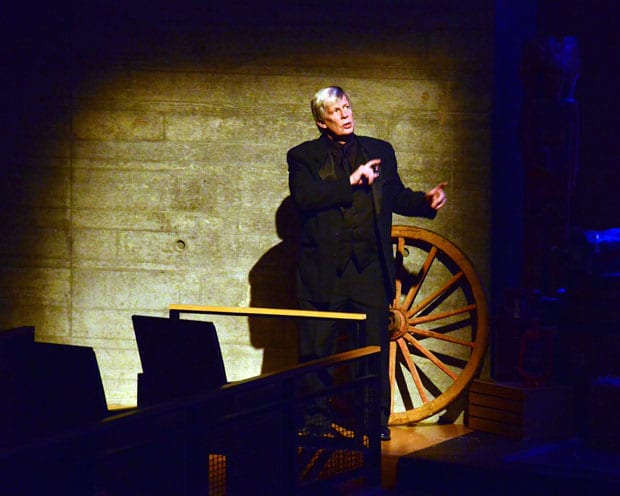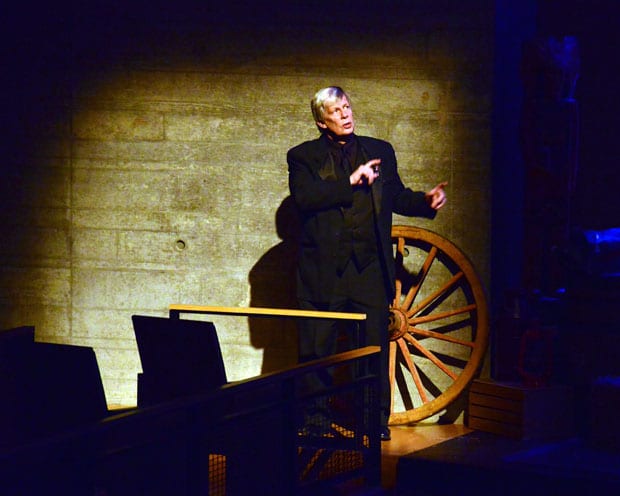As the Turtle Creek Chorale’s sign language interpreter, Don Jones has spent decades artfully crafting song lyrics for the hearing-impaired

Don Jones, performing last fall at the Turtle Creek Chorale’s Heartland concert. Jones has served as ASL interpreter for the chorale since 1989. Photography by Michael McGary
By Elaine Liner
Even when he’s chatting over a nosh at La Madeleine, Don Jones lets his hands do most of the talking. His fingertips dance across the tabletop to make a point, then his palms gently meet as punctuation. When his left hand topples a coffee cup — as it did during a recent interview in Oak Lawn — Jones laughs. Big gestures often lead to little spills.
Fans of the Turtle Creek Chorale will recognize Jones — the silver-haired gent in the tux, standing on the skirt of the stage — as the American Sign Language interpreter for all the group’s concerts since 1989. Jones has also signed for the Catholic Diocese of Dallas for 40 years, is currently signing mass at St. Thomas Aquinas Catholic Church in East Dallas and is now in his sixth year with the Dallas Independent School District as an “inclusion teacher,” traveling school to school to check on classroom accommodations for hearing impaired and dyslexic students.
It’s the concerts with the TCC, however, that allow Jones to use his signing skills with an artistic flair. Signing musical performances isn’t done word-for-word, he explains. “It really is an interpretation of the words, the music and the message. I use ‘poetic motion,’ you can call it, to put across the meaning and the emotion.” That includes not just ASL signs and some finger-spelling, but body language and facial expressions.
Jones recalls his first appearance with the chorale as one of his toughest assignments. He’d been hired mid-season when Dr. Tim Seelig, then in his second year as TCC’s artistic director, saw him sign the Lord’s Prayer at a spiritual conference and asked him to sign for the chorale’s next concert: Verdi’s Requiem, which required a signer to interpret three different texts being sung simultaneously. In Latin.
“I studied it beforehand, of course, but I highlighted the sections in different colors to get everything in,” says Jones. “When you’re signing with a choir, you can’t have that time delay that you normally have in interpreting speech. In music, you need to be right on the words. You have to know the words.”
Pre-performance homework for Jones can mean learning the libretti of operas sung in German, French or Italian. Jones spends hours rehearsing signing lyrics, from hymns to Broadway show tunes to the rapid-fire words of rap songs, as done recently by soloists at the Dallas Sings/Dallas Strong concert on July 14. That event saw the TCC joining with the Credo Choir and other singers in a gesture of community healing after the killings of five police officers.
“Rap lyrics are not a problem,” Jones says. “I looked them up and printed them out. Then in that performance, they changed the words. I’m standing right next to the singer and know I’m on camera. I’m live interpreting a rap that I have never heard before. But with rap, you have to listen for what it means and not listen just for the words. The words won’t make sense. You want to interpret the feeling in the words. Rhyming is not germain.”
Jones, now 65, was drawn to sign language as a teenager. His younger brother is hearing impaired and Jones learned to finger spell to help him with vocabulary words. A summer job as an assistant to a deaf/blind college student led to more studies in the art of sign interpretation. After graduating from University of Oklahoma, Jones worked as a teacher and interpreter in New Orleans before coming to SMU in the mid-1970s to earn a graduate degree in “deaf ed.”
Having outlived two partners, Jones now is single and says he thinks of the TCC as his community and extended family. “If I weren’t the ALS interpreter for the chorale, I would sing in it,” he says. “The music is beautiful, of course, but the message of the Turtle Creek Chorale is what keeps me there… their basic philosophy of inclusion — of different races, sexual preferences, identity, physical abilities. Providing a means for persons with hearing impairment to be included is a natural part of this philosophy.”
He says he also experiences something the audiences at TCC’s concerts can’t see. “I am in the unique position of looking out at the crowd and feeling their reaction, looking into their eyes and seeing their faces,” says Jones. “It can be emotionally overwhelming.”
The chorale, now led by artistic director Sean Baugh, adds singers through open auditions once a year (coming up on Sept. 3, at the Sammons Arts Center). The first major concert this season — the seasonal A Not So Silent Night from Dec. 8–11 — is at City Performance Hall, a venue whose onstage acoustics are tricky for clearly hearing speakers and singers, Jones says.
Is there any piece of music too difficult to interpret in American Sign Language? Wagner’s Ring Cycle would be all but impossible, he says. And what about the physical toll felt from 40 years of signing?
“I’m getting arthritis in my thumbs,” he says, “but using my hands so much is good physical therapy for it. I don’t think arthritis will interfere with signing.”
He fans his fingers over the table. Are those manicured nails? “I do get a manicure,” says Jones, his blue-gray eyes twinkling at the question. “I’m very proud of my hands.”
This article appeared in the Dallas Voice print edition August 12, 2016.











